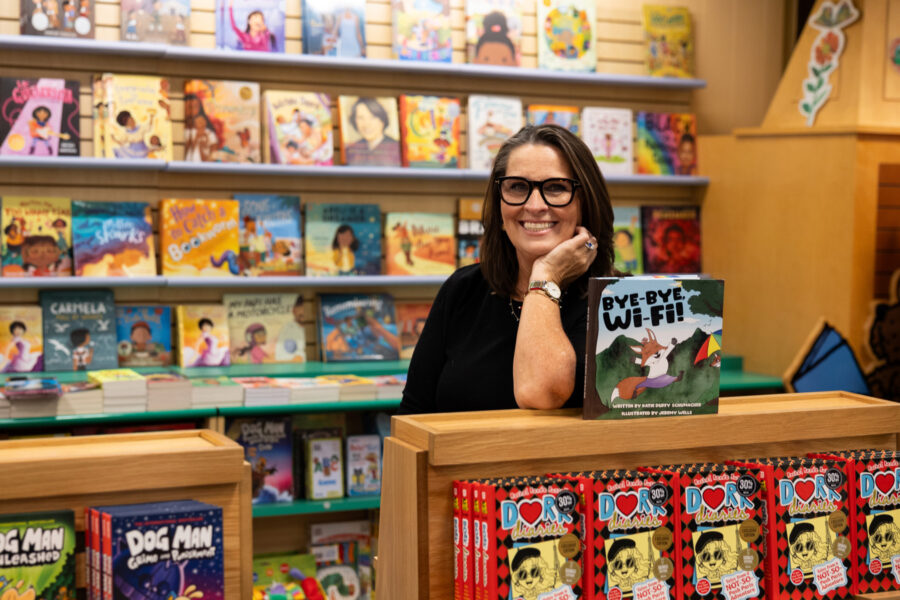
Being young isn’t easy and it seems like the rapid rise of social media technology aims to make it harder even to be young. The “playground” and classrooms extend beyond school, creating digital spaces with little to no supervision. So much information is available online, much of it false, much of it harmful. It’s overwhelming for a parent to know where to start: How do parents help their children navigate a life that is increasingly online?
Enter Katie Duffy Schumacher, Southampton resident, founder of dontpresssend.com and recent author of the new children’s book Bye-Bye, Wi-Fi focused on helping parents and children enjoy time together offline. As kids get phones earlier and earlier, Bye-Bye, Wi-Fi is a charming story and is an excellent resource for parents who want to share some time offline with their kids (who doesn’t?).
Social Media and cellphones aren’t going away, but the need for parents to model successful use of technology is now more important than ever. Especially with young people getting online earlier and earlier, this children’s book is a vital resource for parents. “We know from data how much 1–3-year-olds are learning through their eyes; they see you on their phones. Let’s educate from the start with finding technology’s place in our lives. And it doesn’t hurt that the illustrations are just so cute and fun with illustrations by Jeremy Wells.”
In Bye-Bye, Wi-Fi, the Fox family faces a day without the internet, discovering the joy of unplugged activities like games, coloring, and sharing a home-cooked meal. The story beautifully captures the essence of connecting with loved ones in the present moment, emphasizing the importance of a balanced relationship with technology.
The data are alarming concerning the impact of social media on young people. Alarming is an understatement; for many experts, social media has caused a mental health crisis – one that was only exacerbated by the COVID-19 pandemic.
Sometimes, it can feel like all the changes from technology are inevitable like there is nothing we can do. For Katie, it just means adults must be more proactive, meeting kids where they are and helping them learn how to use social media without it controlling their lives.
Katie has been working with parents and teachers for over a decade, invaluable experience to accompany her master’s degree in early childhood development. Moreover, she has real experience dealing with social media as a parent and teacher is a media specialist, parent, and teacher.
“We’re the first generation of parents dealing with phones. It seems like there are no rules. It’s surprising that parents are shocked to hear what goes on these apps. As a parent, you can’t think that things like cyberbullying aren’t happening.”
Before the pandemic, Katie toured around the country and the globe to promote her 2017 book, Don’t Press Send. Gaining considerable attention (she was even featured on the Sag Harbor Express), parents and teachers have responded with gratitude for having tools to combat social media’s impact on kids. “As a teacher, I came up with a community service lesson plan to help educate teachers and teens with our Don’t Press Send Pledge.”
To me, I was moved to hear Katie describe her work as teaching kids: “How to build self-esteem when so much is telling kids they’re not good enough.” That is a powerful message and an important one—her children’s book shifts the focus from teens to younger kids.
“Right after the pandemic, when I started going back to schools, it was mostly elementary schools inviting me to speak. The data show that kids have phones at a younger and younger age. Who is helping them understand how to use that technology? Moreover, what do they do when they don’t have access to the internet? That was the inspiration for Bye-Bye Wi-Fi ”
Katie is certainly no Luddite and does not advocate ignoring technology; in fact, ignoring it is part of the current problem. “What I’m trying to do is address digital well-being and a mindful approach to social media. To promote kind and careful online communication.”
Helping parents of young children focus on life OFFline is a vital step in starting these conversations. “We can now see that our attitude in the early years of social media was too laissez-faire: Let’s give an impulsive teen a device so they can be impulsive. What could go wrong? My new book helps to start a proactive conversation early, instead of reactionarily when they become teens.”












